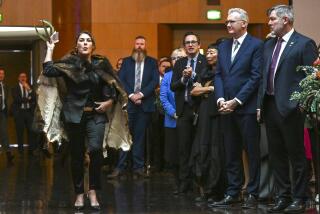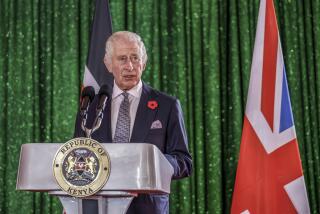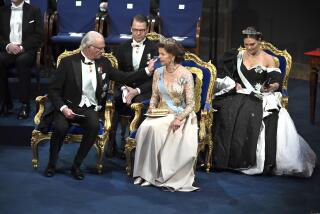Crown Prince Arrives in Badly Split Yugoslavia
- Share via
BELGRADE, Yugoslavia — Crown Prince Alexander arrived Saturday in the ancestral Serbian homeland he had never seen before, where deeply troubled followers unsure they want his intervention in the deadly Yugoslav civil war heard him vow to bring peace.
Although tens of thousands of cheering supporters flocked to welcome the exiled prince, Serbia’s Communist leadership fought against his short but symbolic visit and has shown no signs it will heed his calls for negotiating an end to the bloody conflict.
For the record:
12:00 a.m. Oct. 9, 1991 For the Record
Los Angeles Times Wednesday October 9, 1991 Home Edition Part A Page 3 Column 1 Metro Desk 2 inches; 47 words Type of Material: Correction
Yugoslav royalty--A report in The Times of Oct. 6 about Crown Prince Alexander’s visit to Yugoslavia erred in relating his parents’ history. His father was King Peter II, who was unmarried when he fled the invading Germans in 1941. The king married Princess Alexandra of Greece in 1944 while in exile in London and Alexander was born in 1945.
With Serbia’s Communist strongman, President Slobodan Milosevic, more popular than ever as he steers his people toward victory over rival Croatia, Alexander’s unwelcome intercession seemed likely only to drive a wedge between the Serbian forces and intensify the Yugoslav crisis.
As the heir to the crown appealed for peace, Serbian guerrillas backed by the federal army pressed ahead with a weeklong offensive against Croatia, bombarding the city of Karlovac in an apparent attempt to cut off the Croatian capital of Zagreb from its Adriatic Sea ports.
Serbian forces also were reported to be closing in on the historic Adriatic resort of Dubrovnik and to be striking heavily at the last Croatian strongholds in the battle-scarred eastern regions of the republic.
The Yugoslav People’s Army, whose officers corps is 70% Serbian, had warned a day earlier that it would not spare Dubrovnik’s historic treasures if federal forces thought Croatian national guardsmen were taking refuge in the walled city.
Emergency measures to ensure adequate military mobilization were also announced Saturday, including moves that appeared to be tantamount to martial law.
Draft evaders and deserters could face imprisonment or the death penalty now that Yugoslavia has been declared by Serbian leaders to be confronted with “an immediate threat of war,” the Tanjug news agency reported, quoting unnamed military law experts.
As the Serbian-led army has escalated its assault on Croatia, successive federal call-ups have been increasingly ignored. Only about 15% of the latest summonses issued to reservists in Belgrade were answered.
Nearly 1,000 have been killed in Yugoslavia since the republics of Slovenia and Croatia declared independence from the federation on June 25. Serbia has fought against Croatian secession, insisting it would endanger the 600,000 ethnic Serbs who live in that republic.
The raging battles across Croatia highlighted the failure of the latest truce to be declared by the combatants and European mediators.
Although Milosevic and Croatia’s nationalist president, Franjo Tudjman, pledged support for a cease-fire at a European Community meeting in the Netherlands on Friday, the fighting has clearly intensified.
Federal Defense Minister Gen. Veljko Kadijevic insisted Saturday that Croatian forces had to end their blockade of army barracks in the republic before a halt to the offensive would be ordered. Tudjman called for a simultaneous cease-fire as a condition for ordering his republic forces to lift their blockade.
Against this backdrop of intensifying conflict, Alexander II--heir to the throne of the Karadjordjevic dynasty who was born in exile in 1945--made his first sojourn to the land of his ancestors in an atmosphere of controversy and regal pomp.
He flew to Belgrade aboard his private jet, crossed himself upon clearing the thronged airport and knelt to kiss a tray of grassy turf brought from the royal family’s native village of Topola.
“It is the happiest day in my life. I always knew that one day I would come home and this wish has come true today,” the 46-year-old London businessman declared as jubilant supporters waved royalist flags and chanted, “We want the king!”
Alexander has insisted his two-day visit is apolitical, but it came at the urging of the opposition Serbian Renewal Movement, whose leader, Vuk Draskovic, favors restoration of the monarchy.
“I have come because of my concern for the situation in Serbia, in the hope that I will contribute to peace,” Alexander told the cheering crowd. “My mission is a mission of peace, confidence and democracy, which concerns all people of this country regardless of their political beliefs.”
In an interview at his Belgrade hotel--Serbia’s Communist authorities have refused to return the royal family’s property--the crown prince said he would try to persuade the combatant republics to negotiate their differences at talks in Geneva that would include opposition forces and religious leaders as well as the governing parties of Serbia and Croatia.
“I’m very concerned about what I consider to be the wrong side of nationalism,” said Alexander, who is more comfortable speaking his native English than the halting Serbo-Croatian he has only recently learned. “We should be proud of our origins and proud of our customs, but these should not be used for conflict.”
Despite his stated aim of working for peace, Alexander conceded that he had received no indication from Milosevic that he would agree to new talks.
Milosevic, a hard-line nationalist blamed for whipping up anti-Croatian hysteria among his fellow Serbs, was believed to have inspired the head of the Serbian Orthodox Church to try to prevent Alexander’s return. Patriarch Pavle, closely allied to Serbia’s ruling circle, wrote to the crown prince last month contending it was the wrong time for him to visit.
While Milosevic has succeeded in drawing young nationalists into the fight against Croatia, many of the guerrillas emulate the staunchly royalist Chetniks of World War II. A split among the Serbs over the monarchy issue could weaken their position in the war they are currently winning, inviting Croatian retaliation and continued bloodshed.
During his brief visit, Alexander planned to attend a memorial service for his grandfather, Alexander I, who was assassinated by Croatian fascists while on an official visit to France in 1934.
Alexander I reigned over the Kingdom of Serbs, Croats and Slovenes created from remnants of the Austrian and Turkish empires after World War I. But the royal dynasty begun by Karadjordje--”Black George”--after the Serbian uprising against Ottoman Turkey in 1804 has always been considered by the other Yugoslav nationalities to represent Serbian interests over those of the federation.
Alexander’s parents, King Peter and Queen Alexandra, fled Yugoslavia in 1941 as Nazi Germany invaded. The Yugoslav monarchy was abolished after World War II, when victorious partisans led by Marshal Josip Broz Tito set up a Communist republic in 1945.
BACKGROUND
Crown Prince Alexander was born in London’s Claridges Hotel on July 17, 1945, two months after the Communists took power in Yugoslavia. Since the heir to the Karajordjevic throne must be born on Yugoslav soil, the British government declared that the hotel suite was Yugoslav territory. The dynasty took its name from Karadjordje Petrovic, the leader of a 1804 Serbian uprising against the Ottoman invaders who ruled the Balkans for 500 years.
More to Read
Sign up for Essential California
The most important California stories and recommendations in your inbox every morning.
You may occasionally receive promotional content from the Los Angeles Times.














